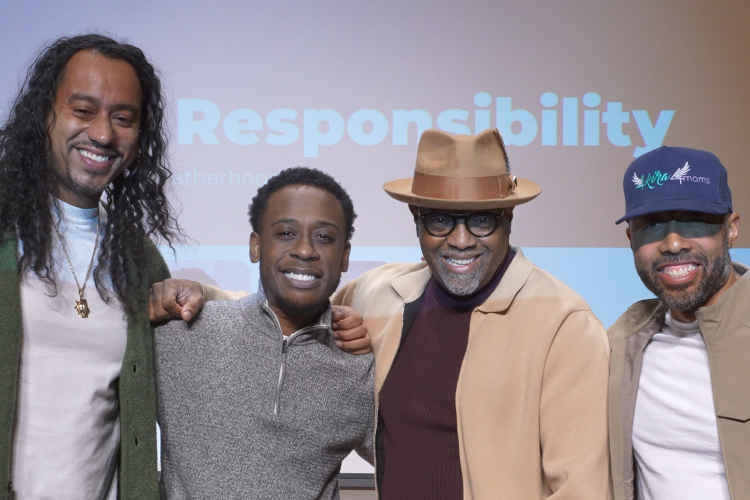By Kenneth Braswell, CEO, Fathers Incorporated
The “Roots and Responsibility” conversation at the Auburn Avenue Research Library unfolded like a gathering on someone’s front porch — truth-telling without pretense, laughter sitting next to pain, and a room full of people nodding because they recognized themselves in what was being said. When Mario Reyes, Marquis Baker, Charles Johnson, and I sat down together on a panel at the “Collecting, Researching, and Writing the Black Diaspora Conference,” something stirred that belonged to all of us: A community was remembering itself.

For too long, people outside our neighborhoods have been telling the story of Black fatherhood. They wrote the headlines, built the stereotypes, and framed our families through deficits instead of depth. Yet the truest stories — the ones passed down in living rooms, whispered at bedtime, scribbled inside old photo albums — have been here all along. They simply haven’t been amplified with the same volume as the lies.
That evening at the Library reminded me that reclaiming the narrative of Black fatherhood isn’t about getting anyone’s permission. It is about standing in the fullness of who we already are and inviting our communities to speak that truth out loud.
When Marquis described his grandfather teaching him to read, the room softened. Here was literacy being passed down at a kitchen table, through newspaper print and patience. That’s a story as old as us — Black men creating pathways for their children with whatever they’ve got in front of them.
Charles remembered his grandfather filming every moment with a VHS camcorder resting on his shoulder. Not a “special occasion” father. Not a “when he had time” father. An “every day, every event, every memory” father. And even now, years later, Charles can still feel that presence like his own heartbeat.
Mario shared the story of a rainy day in the Bronx when he and a crowd of neighborhood kids followed a treasure map his father created, only for the rain to start pouring down during their quest. As the rest of them prepared to quit, his father told them, “Why would you leave now? This is when the adventure begins.” That line followed Mario into manhood, into fatherhood, and onto that stage.
These were not heroic moments meant for a movie. They were examples of the small, textured gestures Black men make every day — moments that shape us long before we realize it.
When it was my turn, I spoke about TV dad James Evans from Good Times because, for so many boys growing up without seeing their fathers, he was the model, the mirror, the reminder that strength could live in struggle. For kids like me, when James Evans died, something in us went quiet, but we also learned that the presence we longed for could rise up in us as men, even if we didn’t inherit it.
The Truth About Black Fathers
A thread that ran through the entire night was this: Black fathers are not surprising. We are not an anomaly. We are not rare. We are simply under-told.
Society has repeated the idea that Black men don’t stay, don’t care, don’t read, don’t raise. But every brother on that stage knew a different truth.
I said something that still resonates with me now: Nothing surprises me about Black fathers because my expectations of them are already high. The love is there. The desire is there. The ache is there when they can’t see their children. The frustration is there when systems push them to the margins. And the willingness is there to show up, again and again, even when no one celebrates it.
This isn’t mythology. This is everyday life.
You see it when a single dad ties his daughter’s shoes with hands still rough from work. You see it when a father sits at a cafeteria table during lunch because visitation hasn’t come through yet. You see it when fathers crowd the sidelines on game days, their cheers rising like a drumline. You see it in the men who didn’t have fathers but refuse to repeat that cycle.
Our community knows these stories because we live them. The challenge now is naming them out loud so our children can hear the truth above the noise.
One of the most powerful moments on our panel came when Marquis shared the story of calling his father after years of silence. What started as distance became healing. What began with questions became understanding. The very thing he had feared he’d never get (a relationship) began with a conversation rooted in honesty, not judgment.
We don’t talk about these moments enough. The reunions. The apologies. The quiet reconciliation. But healing is part of our narrative, too. Letting go is part of our narrative. And forgiveness, when it is safe and earned, is also part of our narrative.
Black Fatherhood and Maternal Health
Charles added another dimension to the conversation that our community must hear: Fatherhood starts long before birth.
He spoke boldly about maternal health, including how many mothers, especially Black mothers, aren’t surviving childbirth. He reminded us that our presence in doctor’s offices, prenatal appointments, delivery rooms, and postpartum recovery is not optional. It is necessary.
His work in honoring the life of his wife, Kira, is a reminder that Black fatherhood is a partnership from the beginning. The health of our families begins with the health of our mothers. And when fathers are engaged, informed, and supported, outcomes improve for everyone.
That message belongs in every barbershop, church, school hallway, and living room — everywhere young men are learning how to become fathers. A father’s presence does not begin at the crib: It begins at the clinic.
“Wholeness” in Black Fatherhood
The final question of the night was about what “wholeness” would look like for each of us. And the answers came from deep places.
Marquis imagined a future where his son reads to his own children, a full circle moment rooted in the literacy his grandfather passed to him.
Charles imagined a world where his sons no longer fear what happened to their mother, a world where maternal health disparities are part of history, not their inheritance.
I imagined a moment 10 years from now when a young person approaches me and says, “My father changed after going through your program,” not because he became perfect, but because he became present.
That is the heartbeat of our work at Fathers Incorporated — not raising men who escape their story, but men who rewrite it.
This is the message our community deserves: Black fatherhood is rooted, not broken. Resilient, not fragile. Expansive, not limited. Sacred, not secondary.
What we need now isn’t another study or another stereotype or another headline. We need microphones in the hands of the men who are living the truth every day. We need space for honest conversations across generations, households, and experiences. We need to celebrate the fathers doing the work and support the ones who are still fighting to get there.
We need to reclaim our narrative not as a rebuttal, but as a declaration.
And the truth is simple: Black fatherhood has never needed saving. It has only needed witnessing.



